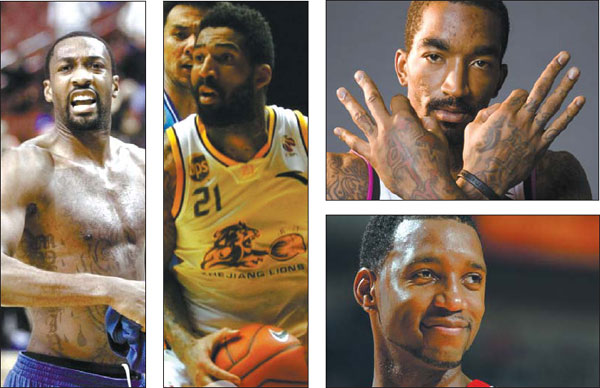CBA changing philosophy on recruits
 0 Comment(s)
0 Comment(s) Print
Print E-mail China Daily, March 13, 2013
E-mail China Daily, March 13, 2013
 |
|
NBA stars (clockwise from left) Gilbert Arenas, Wilson Chandler, J.R. Smith and Tracy McGrady are among the big names who played in the CBA but failed to bring much success to their teams. |
Fame doesn't necessarily translate into success on a basketball court.
Chemistry? That's another story.
Look no further than the current Chinse Basketball Association season, during which big-name imports drew the headlines, but little in the way of success.
Partial blame, at least, goes to a lack of commitment and mutual understanding.
The CBA lured a stream of high-profile US talent including former NBA scoring champion Tracy McGrady and three-time All-Star Gilbert Arenas.
As has often been the case in recent seasons, however, both enjoyed more in the way of celebrity than success.
The Qingdao Eagles, who signed McGrady and set their sights on a run to the title, finished dead last in the 18-team league, far worse than last season's ninth.
The Shanghai Sharks, who landed Arenas after finishing sixth last season, didn't reach the playoffs either, with Arenas sitting out most of the season with a groin injury.
Last year's evidence was more plentiful, when star players J.R. Smith and Wilson Chandler jumped over during the NBA lockout. Both left with plenty of money and great individual numbers, but made little progress for their Chinese teams.
It's all combined to force the star-obsessed league to reflect on what kind of imports it really needs.
"First of all, they need a positive attitude to gel with the Chinese roster and the culture," Tianjin Gold Lions veteran forward Zhang Nan told China Daily recently.
"If he has the will to settle down and work as a whole (with other players), that helps. Otherwise, it won't work on a long-term basis."
Zhang's team failed to reach the playoffs even though it had three foreigners, including an extra Asian player allowed for teams that finish near the bottom of the standings.
Dongguan Leopards coach Brian Goorjian has been in the CBA since 2009, and has committed himself to developing local players with modern methods.
"It's a motivation to be here. Some guys come at the end of (their careers) to get a payday. ... They come here, they can get treated like royalty," the 59-year-old American said.
"(The CBA) is an easier route to your final years. And those (kind of) guys don't take you to the promised land."
Goorjian has done a solid scouting job over the past years. His choices have included US guard Josh Akognon and forward Shavlik Randolph, both of whom have earned respect in the CBA despite arriving as virtual unknowns.
Shandong's US guard, Pooh Jeter, and Jordan international Zaid Abbas are also among those low-profile yet high-value imports. Both actively built chemistry with their teammates while lifting Shandong from 13th last year to the semifinals so far this year.
"I treat my teammates like brothers and we have a lot of time together off the court. That kind of helps us to produce a lot of chemistry together," Abbas said.
Foreigners whose only talent is scoring don't do the trick any more in the CBA, so teams are focusing on players with a good all-round game, said former national forward and current assistant coach Li Nan.
"CBA teams have become more sophisticated at picking foreigners with skill-sets that they need. No more pure scorers," Li said.
Prolific scorer Quincy Douby is a perfect example. He scored a league-record 75 points in a game earlier this season, but couldn't help his Zhejiang Golden Bulls survive in the first round of the playoffs, where they lost to the Guangdong Southern Tigers in three straight games.
In contrast, Beijing Ducks former NBA All-Star Stephon Marbury has focused more on creating plays for his teammates than scoring, a shift that's worked well as the Ducks attempt to defend their title.
Moreover, his commitment not only to the league but also the culture, has helped him shed any labels as an arrogant foreigner.






Go to Forum >>0 Comment(s)